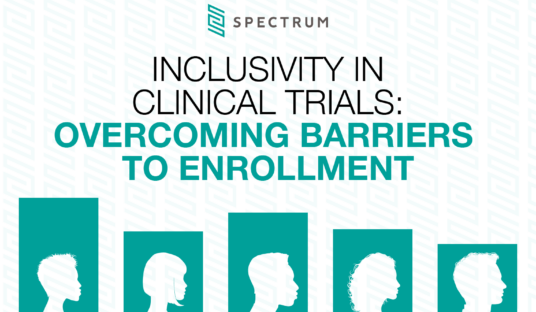Clinical Trial Experience
The Importance of Diversity in Clinical Trials for Better Health Outcomes

April is National Minority Health Month and an important reminder to amplify awareness on improving the health of racial and ethnic minority populations. A huge step in the right direction came in February, when the FDA required clinical trial sponsors and investigators to develop plans to enroll more participants from underrepresented populations in the U.S. into clinical trials.
To date, clinical studies fall short of diverse representation:
- African American/Black patients make up 13.4% of the population but only 5% of trial participants
- Hispanic/Latino patients make up 18.1% of the population but only 1% of trial participants
- Non-Hispanic white patients make up 60% of the population but over 77% of trial participants
The lack of diversity in clinical trials isn’t a new issue, but it is still concerning as approximately 20% of drugs have different effects depending on a patient’s ethnic diversity. These differing effects are attributed to polymorphisms in genes encoding drug-metabolizing enzymes (DMEs) and drug transporters. Polymorphisms directly influence pharmacokinetics and pharmacogenomics, and it is important to understand the differences in genetic variants of DMEs and transporters that determine differences in drug exposure, efficacy, and safety between ethnicities.
What does the guidance mean for diversifying clinical trials?
The diversity plan draft guidance offers a framework for the FDA to engage stakeholders on a strategy to implement an enrollment plan and ensure trials enroll diverse populations. The draft guidance focuses on specifically naming the inclusion of underrepresented racial and ethnic populations in the United States, such as Black or African American, Hispanic/Latino, Indigenous and Native American, Asian, Native Hawaiian, Other Pacific Islander, and other persons of color. The draft guidance also advises sponsors to seek diversity in clinical trial enrollment beyond populations defined by demographics such as sex, gender identity, age, socioeconomic status, disability, pregnancy status, lactation status, and comorbidity.
However, despite previous sets of recommendations to improve clinical trial diversity*, there has been little, if any, improvement in increasing the number of clinical trials that adequately account for diverse populations or diverse data sets. In a 2022 study, researchers analyzed records from all U.S. clinical trials registered on ClinicalTrials.gov from March 2000 to March 2020. They found that among the 20,692 US-based trials with reported results, only 43% reported any race/ethnicity data.
What are the challenges?
One of the main reasons it is challenging to significantly improve ethnic and racial diversity and representation in clinical trials is the lack of enforceability in the guidance. Accountability needs to be included in the current draft and previously finalized guidance as there are no consequences if the guidance is not followed. This lack of enforceability means there is no real incentive to take steps to change and improve representation in clinical studies, thus perpetuating the gap in health inequity among minority populations. Achieving greater diversity in clinical trials equates to the development of better, safer and more effective ways to fight diseases that often disproportionately impact diverse communities.
At Spectrum Science, we take a collaborative approach to help sponsors draft innovative and creative diversity plans to achieve enrollment goals, exceed diversity targets and, alongside our clients, help close the gap on health inequity. We hope you will join us on this journey.
*A breakdown of the current and previous guidance on Diversity or Diversity Data in Clinical Trials is displayed below.
| Guidance Title | Topic | Draft/Final | Issue Date |
| Diversity Plans to Improve Enrollment of Participants From Underrepresented Racial and Ethnic Populations in Clinical Trials; Draft Guidance for Industry; Availability: Draft Guidance for Industry | Draft | 04/13/2022 | |
| Enhancing the Diversity of Clinical Trial Populations – Eligibility Criteria, Enrollment Practices, and Trial Designs | Design, Diversity, Ethics Committee (EC), Ethnicity, Gender, Good Clinical Practices (GCP), Human Subjects Protection (HSP) | Final | 11/09/2020 |
| Evaluation and Reporting of Age-, Race-, and Ethnicity-Specific Data in Medical Device Clinical Studies | Demographic, Diversity, Ethnicity, Gender, Investigation, Medical Device, Pediatric | Final | 09/12/2017 |
| Collection of Race and Ethnicity Data in Clinical Trials | Demographic, Ethnicity, Race | Final | 10/26/2016 |
Zena Smith is SVP, Clinical Trial Recruitment, and Dr. Tania Martin-Mercado is SVP & Product Lead, Clinical Trial Recruitment at Spectrum.
Perspectives

Clinical Trial Experience
Inclusivity in Clinical Trials: Overcoming Barriers to Enrollment

Clinical Trial Experience
FDA Additions to Informed Consent – Will they help improve participant engagement?

Clinical Trial Experience
The Power of Patients as Partners 2023 Conference: Turning Insights into Action

Clinical Trial Experience
Diversity in Clinical Trials: Beyond Fantasy





